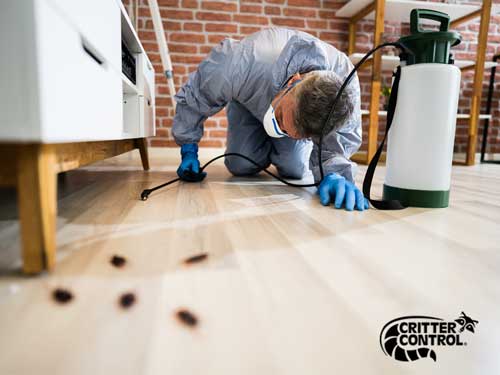Grasping the Art of Pest Control: Proven Strategies for Long-Term Avoidance and Elimination
Pest infestations can be a persistent difficulty for homeowners and organizations alike, requiring a calculated strategy to effectively take care of and eliminate these unwanted burglars. By understanding the art of pest control through tested methods for long-term prevention and elimination, one can establish an aggressive defense versus potential hazards. Understanding the actions of pests, implementing integrated parasite monitoring techniques, and using natural remedies are simply a couple of essential elements important to achieving long-term success in this venture. Nonetheless, the complexities of keeping sanitation, carrying out regular inspections, and attentive tracking play just as essential roles in maintaining a pest-free atmosphere. As the battle versus parasites remains to evolve, taking on a detailed technique comes to be extremely important in guarding your residential property from prospective damage.
Comprehending Pest Habits
To successfully apply parasite control strategies, it is crucial to understand the intricate behaviors exhibited by various pests in different environments. By studying these behaviors, bug control experts can determine the most susceptible points in the pest's life cycle to target interventions more effectively.
Recognizing this, pest control specialists can concentrate on securing entrance points and eliminating food attractants to discourage these parasites. By attending to dampness problems and securing crevices and splits, infestations can be significantly minimized.
Executing Integrated Parasite Monitoring
Carrying Out Integrated Insect Monitoring involves using a holistic technique to resolve insect concerns by combining numerous control tactics and methods. This approach emphasizes prevention, surveillance, and control of pests with a mix of organic, cultural, physical, and chemical interventions. By incorporating numerous strategies, Integrated Insect Administration (IPM) intends to decrease making use of chemicals while properly managing pest populations.
One secret facet of IPM is recognizing the specific insect issue and comprehending its actions and life process. This knowledge helps in figuring out one of the most ideal control measures to implement. Prevention is also a fundamental principle of IPM, concentrating on getting rid of aspects that bring in parasites, such as water, food, and sanctuary. Normal tracking and examination are necessary to discover bug invasions early and avoid them from intensifying.
Moreover, IPM advertises making use of sustainable and environmentally friendly bug control approaches to reduce harm to non-target microorganisms and the surrounding environment - a1 commercial pest control portland. By embracing an Integrated Insect Monitoring technique, individuals and organizations can efficiently take care of insects while reducing dependence on chemical pesticides
Utilizing All-natural Solutions
Building upon the structure of Integrated Insect Management, a change towards making use of natural solutions offers an environment-friendly approach to pest control. Natural solutions harness the power of nature to deter and get rid of parasites without using harsh chemicals that can hurt the setting, humans, and helpful microorganisms.

Furthermore, planting pest-repelling plants like marigolds, lavender, and mint around homes and yards can aid prevent insects normally. These plants release odors that pests discover undesirable, driving them away without the requirement for chemical intervention.
Preserving Cleanliness and Health

Regularly checking and cleaning hard-to-reach locations such as behind appliances, under sinks, and in storage wardrobes is vital for recognizing and getting rid of possible insect environments. Clutter ought to be decreased as insects typically seek sanctuary in heaps of items or debris. Applying a routine cleaning timetable and ensuring all members of the house or employees are informed on correct hygiene methods can go a lengthy means in pest prevention. By keeping tidiness and health criteria, the environment ends up being much less friendly to bugs, inevitably sustaining long-lasting bug control efforts.
Routine Assessments and Tracking
Normal assessments and keeping track of play a crucial duty in proactively identifying and resolving possible parasite problems prior to they intensify. By performing routine examinations of both the interior and outside of a residential property, pest control experts can detect very early indicators of infestations, bug entry points, and problems conducive to bug task.
Consistent surveillance allows for the early discovery of pest issues, making it possible for quick treatment to avoid prevalent problems that can be difficult and expensive to eliminate. Moreover, regular examinations and keeping an eye on assistance to comply with regulatory requirements and maintain a secure, pest-free atmosphere for occupants. Executing a proactive method with regular examinations and monitoring is a cornerstone of efficient bug monitoring, giving comfort and long-term protection against bug dangers.
Verdict
Finally, understanding the art of parasite control entails understanding parasite behavior, implementing integrated pest management, utilizing natural remedies, maintaining cleanliness and hygiene, and conducting normal examinations and surveillance. By adhering to these tried and tested approaches for lasting avoidance and elimination, people can efficiently manage bug invasions and produce a healthier and more secure setting on their own and their surroundings.
To effectively implement parasite control methods, it is crucial to understand link the elaborate behaviors exhibited by numerous parasites in various atmospheres (a1 pest control in portland oregon bed bugs). By studying these actions, insect control specialists can determine the most vulnerable factors in the pest's life cycle to target treatments a lot more effectively
Applying Integrated Insect Monitoring includes making use of an alternative strategy to deal with parasite problems by incorporating various control methods and techniques. By keeping sanitation and hygiene criteria, the environment ends up being much less congenial to bugs, ultimately supporting lasting pest control efforts.
By performing regular evaluations of see here now both the inside and outside of a property, bug control professionals can discover very early signs of infestations, bug access factors, and conditions conducive to bug task.